The need for a free press at the International Journalism Awards of CIP, ACPE, ACPI and APEA
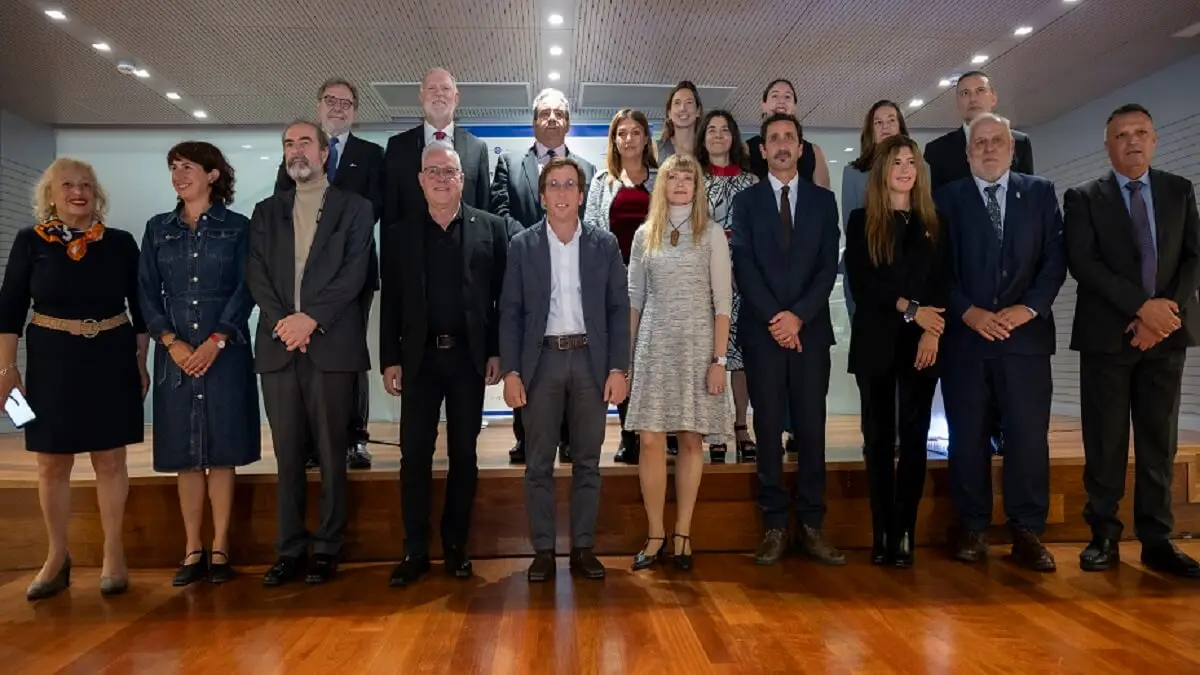
The need for free journalism based on rigour and truth and the importance of freedom of expression as a guarantee of democracy were some of the messages heard during the presentation of the International Journalism Awards, given by the International Press Club, the Association of Foreign Press Correspondents, the Association of Ibero-American Press Correspondents and the Association of Arab Journalists and Writers.
Fundación MAPFRE, Juan Luis Cebrián, Felipe Sahagún, Mónica Uriel, José Luis López Linares, Ofelia de Pablo and Javier Zurita, Joan Manuel Serrat, Paradores de España, The Objective, the Spanish women's water polo team, RTVE Instituto and the Palestinian journalists who died in Gaza were the winners in this edition, hosted by journalist M.ª Ángeles Blanco.
The pavilion of the Jardines de Cecilio Rodríguez in Madrid's Retiro Park was the setting for the event, which was attended by the mayors of Madrid and Salou, José Luis Martínez-Almeida and Pere Granados.
The president of the CIP, Javier Fernández Arribas, stressed that, although attacks on freedom of expression are not new, they must be denounced and insisted that ‘without journalism there is no democracy’. He also spoke of the problems encountered by journalists such as appearances without questions, institutional advertising, polarisation, partisanship... ‘Our commitment to independence and truth is expressed in this recognition of the best professionals and institutions’.
The Mayor of Madrid, José Luis Martínez-Almeida, took the floor, who, after praising all the award winners one by one, made public the importance of defending freedom of expression and the right to transmit information in these difficult and murky times, not only in Spain, but also in the world. For the City Council, he said, it is an opportunity to pay tribute to all these people and to demonstrate its ‘firm commitment to freedom of expression, to improving the conditions of journalists and the media and, therefore, to safeguarding freedom’. The mayor also had a few words for the journalists who died in Gaza, ‘there is no greater demonstration of love than to give one's life for ideals and, in this case, for transmitting information, bearing in mind the real risks that may exist’, and a reminder for the journalists around the world who are risking their lives today. ‘Freedom of expression is the oxygen of our democracy, where we verify our model of democratic social state,’ said the mayor, who concluded by affirming that free media and free journalists will always have the Madrid City Council at their side as guardians of our democracy.
Martínez-Almeida presented the award to Julio Domingo, Director General of Fundación MAPFRE, winner of the Mayor Repercusión Internacional Award, of which he highlighted the great social work it does in more than 26 countries, which allows them to communicate different cultures, improve relations and understand that together it is easier to get out of this complicated situation.
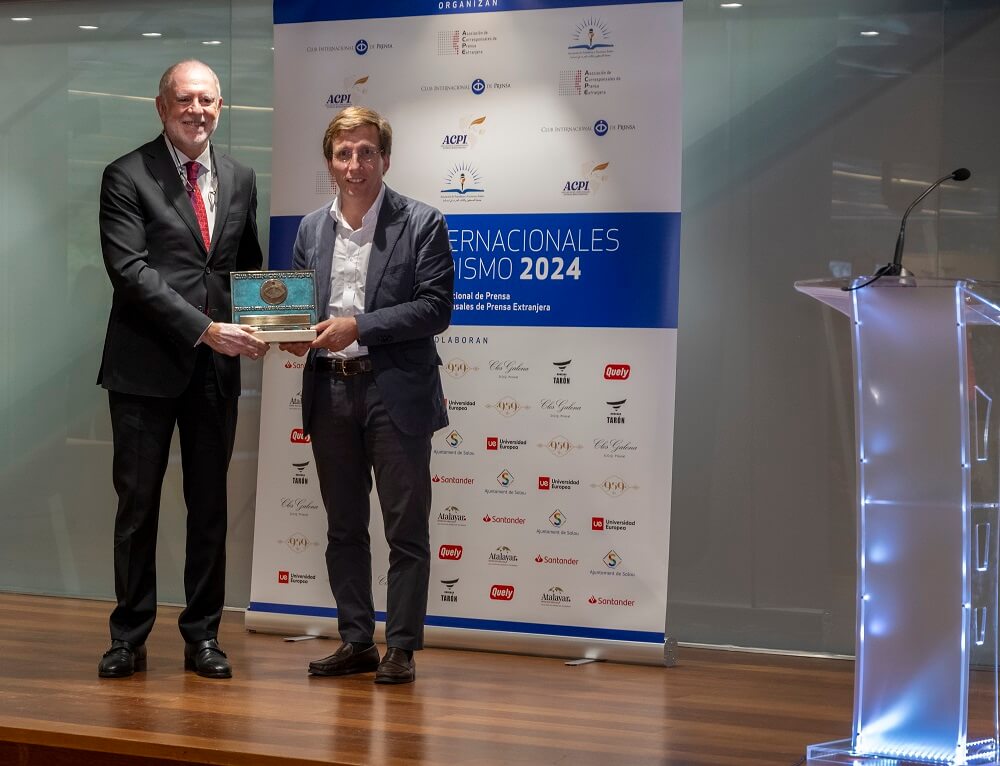
The general manager of Fundación MAPFRE thanked the Foundation for this recognition on behalf of his colleagues and volunteers in the countries where they work. The third sector, he pointed out, is one of the mainstays of society, based on a firm commitment to human rights, equal opportunities and inclusion. Receiving this award, he said, is a great incentive for his Foundation, which will celebrate its 50th anniversary in 2025, to continue with its objective of building a more humane world.
The Career Achievement Award-Salou, Beach of Europe went to Juan Luis Cebrián, who received it from the Mayor of Salou, Pere Granados. The mayor congratulated all the honorees, especially Cebrián, whom he said was ‘a great reference point for the Transition and Spanish democracy’.
Granados reiterated that without the press there is no democracy and without the legal system there is no democracy either, ‘basic pillars of the system’. He also spoke of the importance of knowing the places in order to be able to speak and transmit information with the necessary rigour, which is why he invited people to come to Salou, ‘a modern city with a millenary historical heritage that is making a great effort to transform’ and stressed the importance of tourism, but bearing in mind the well-being of the resident. ‘We are here because Salou unites, those who do not visit Salou do not visit Spain,’ he said.
‘I will not be silent no matter how much with my finger,/ whether touching my mouth or my forehead/, silence warns or threatens fear’. With these verses by Quevedo, which cost him seven years in prison, Cebrián began his speech to highlight the importance of freedom of expression for democracy, but not only as a right of journalists but also of citizens, ‘journalists use this right to try to help citizens understand what is happening to them, we are people who tell people what is happening to people’, he said. The former director of El País stressed that these are bad times for democracy and for freedom of expression not only in Spain, but throughout the world, and he recalled the journalists who have died in Gaza, but also in other forgotten wars, in Ukraine or in Mexico due to drug trafficking. In spite of everything, Cebrián assured that he still believes that journalism, as García Márquez said, ‘is the best profession in the world’, the only thing he has done and known throughout his life.
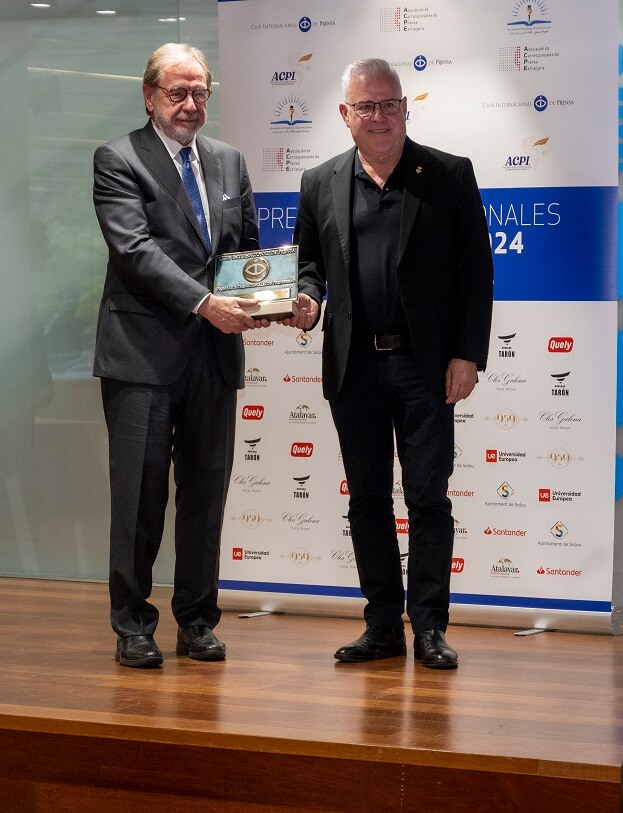
Felipe Sahagún received the Best Spanish Correspondent Award from Elisa Loncán, from the CIP Board of Directors. With more than 50 years of his life dedicated to journalism, and as a connoisseur of the role of war correspondents, the subject of his doctoral thesis, Sahagún dedicated his words to the journalists killed in Gaza, almost all of them Palestinians, a figure that had never been given before, and denounced the manipulation of information. ‘It is impossible to do good journalism without seeing what is happening and this is what is happening,’ he said.
Mónica Uriel received the Best Foreign Correspondent in Spain Award for her work with the Italian news agency ANSA for more than 30 years, presented by Carmen Chamorro of the CIP. In her speech, Uriel said that her award was in recognition of all news agency journalists, because in these times of so many hoaxes and fake news, the agencies are a pillar of credibility and immediacy. ‘In these murky times, news agencies stand as a beacon’.
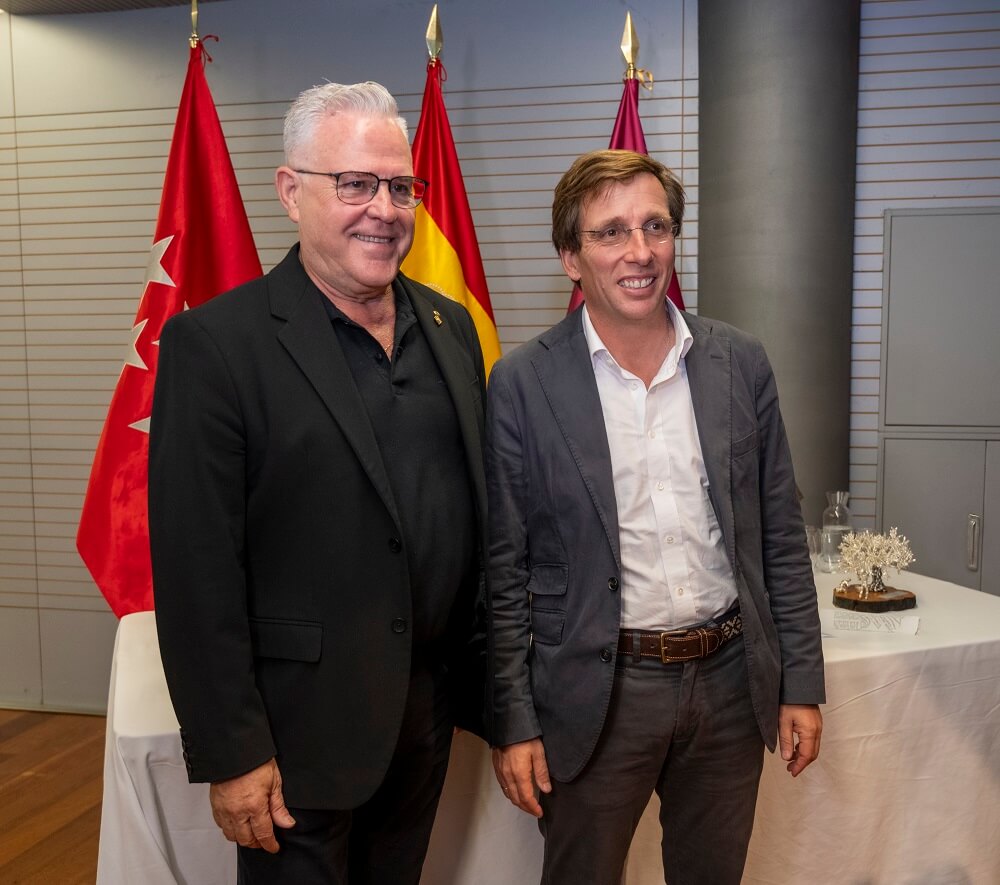
The Documentary Journalism Award was presented by the former president of the CIP, Javier Martín Domínguez, to the director and screenwriter José Luis López-Linares for his ‘Hispanoamérica, canto de vida y esperanza’ (2024). López-Linares recalled that he has spent his whole life making documentaries and in the film world, although for the last two he is receiving different awards ‘and no film awards, which is very interesting, and means that documentaries have more influence than having a good time or having fun in a cinema’. He said he will continue to make documentaries about Spain ‘because if you don't know the history you can't build the future’.
The Journalism at the Limit-European University Award went to photojournalists Ofelia de Pablo and Javier Zurita, co-founders of the production company Hakawatifilm. The award was presented to them by the director of the European University's Journalism at the Limit Seminar, Fernando Ávila. Both stressed the importance of this award to continue creating and telling stories related to human rights and sustainability on different platforms and ‘to bet on a rigorous and honest journalism that reaches with the maximum veracity and improves this democracy that we have’.
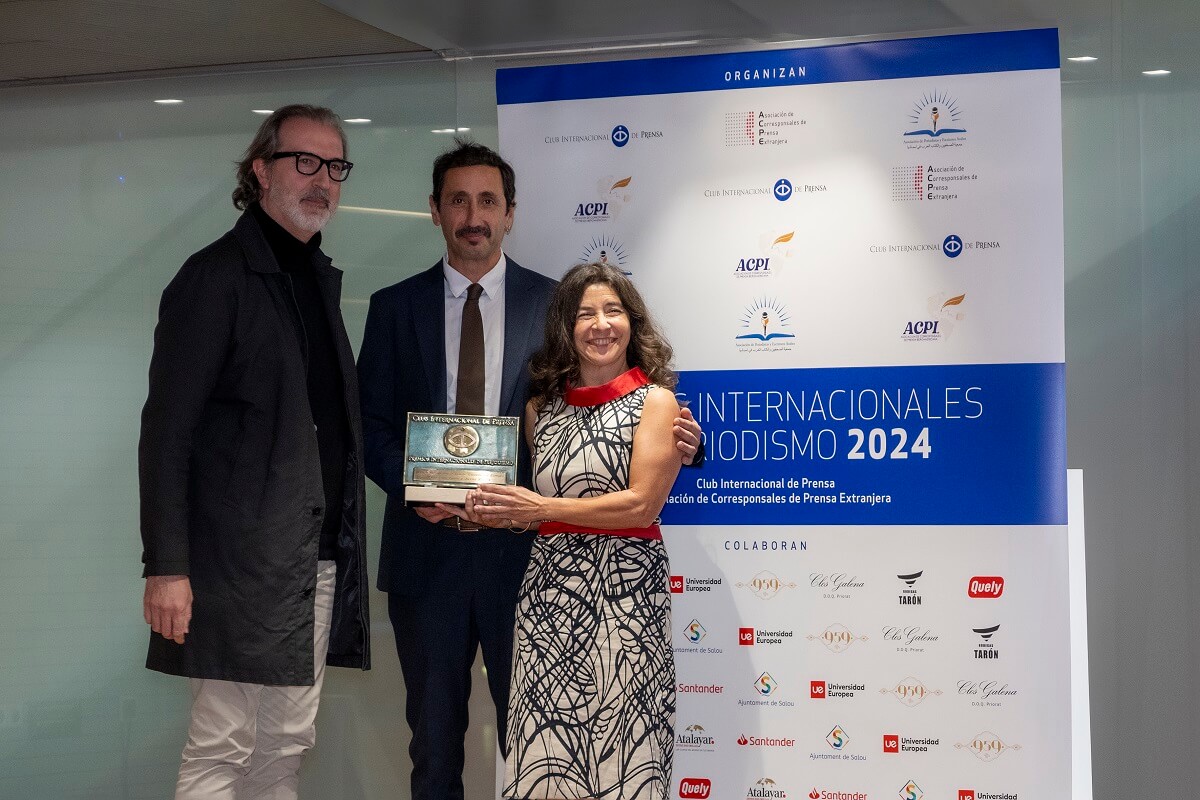
Serrat, Paradores, The Objective and the Spanish women's water polo team
The Association of Foreign Press Correspondents (ACPE), chaired by Armelle Pape Van Dyck, presented four awards: Culture, Tourism, Journalism and Sport. The president criticised the so-called ‘government's regeneration plan’ for wanting to control the media and the ‘deafening silence’ of some associations in the face of this. ‘The function of journalism is to be the counterweight, the critical voice... Power cannot use us,’ said Van Dyck, who said that without a free press and without journalists, democracy is emptied of content and that these awards recognise quality, effort and commitment to the truth ‘even if it bothers those in power‘.
The Culture Prize went to Joan Manuel Serrat; it was collected by his representative José Emilio (Berry) Navarro. Serrat sent a video of thanks in which he praised the work of journalists and recalled the words of García Márquez about journalism as the best profession in the world. ‘I don't know if it is the best, but it is a beautiful profession,’ he said.
The Journalism Award went to the newspaper The Objective, owned by businesswoman Paula Quinteros and directed since 2021 by journalist Álvaro Nieto, who collected it from Vice-President Bertrand de la Grange. Nieto spoke of the role that the newspaper is playing as its investigations are bringing to light scoops such as the Koldo case or those referring to Begoña Gómez, Sánchez's brother, the contracts with ADIF, Globalia, the Ábalos case.... The director also denounced ‘the infamous campaign’ they have suffered and how they are winning all the lawsuits and stressed that, although they are accused of ‘pseudo-media, pamphlets or web pages’, they do not feel alluded to, ‘reporting with freedom and independence has tolls, but our conscience is very clear’.
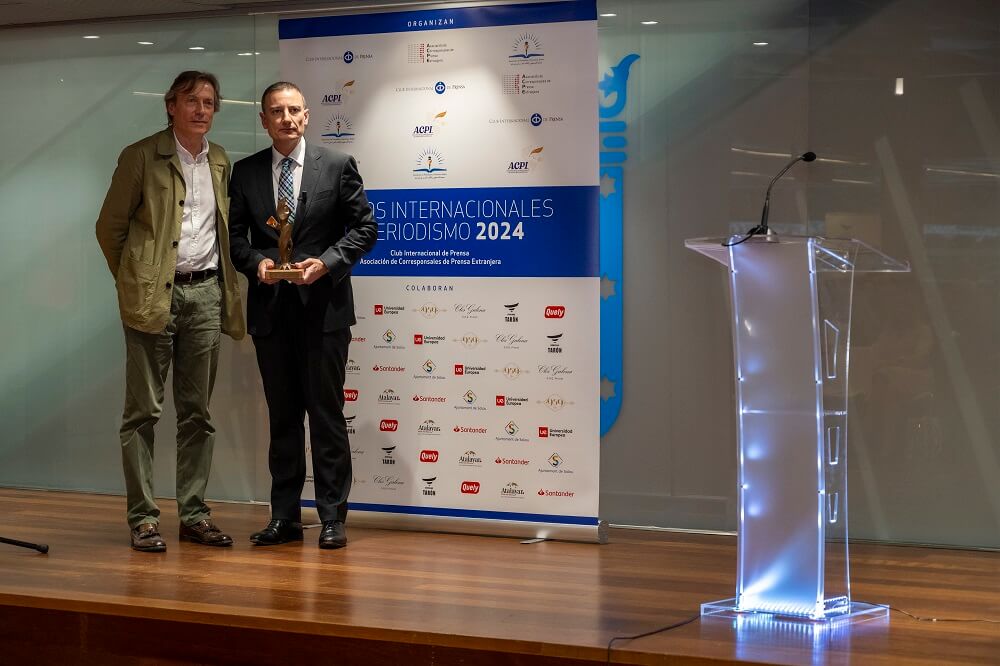
The Tourism Award went to Paradores de Turismo de España for its work in the conservation and promotion of historic buildings of different uses that have been transformed into charming accommodation. The award was presented by Enrique Sancho, Secretary General of ACPE, to Águeda Areilza, Director of Sustainability, who highlighted the mission of Paradores: the conservation of the historical and artistic heritage, of natural areas and the revitalisation of the areas where they are located. She also highlighted the model of sustainable and respectful tourism and dedicated the award to the 5,000 employees who make this reality possible.
The players Ester Ramos and Paula Camús received from the journalists Weixian Wang y Olivia Lin the Sports Award for the Spanish women's water polo team, which won the gold medal in Paris 2024. The players emphasised how proud they were to be able to give visibility to a minority sport and to be recognised for all the effort they make to reach the top.
For its part, the award of the Association of Ibero-American Press Correspondents (ACPI), presided over by Sully Fuentes, went to RTVE Instituto for its contribution to the training of correspondents. The award, designed by artist Linda Sousa, could not be collected.
Finally, the Association of Arab Journalists and Writers (APEAE), chaired by Shereen Dagani, dedicated its recognition and award to all Palestinians killed in the Gaza war. The award was accepted by Naser Abubaker, president of the Palestinian Journalists Syndicate, who pointed out that there are already more than 170 martyrs in Gaza, ‘I don't want to sadden you in this act of celebration, but we must listen to what is happening in Palestine’, he said. This award, he said, ‘is a victory in some way for justice and the principles of human rights and freedom of expression and freedom of information on an international level, it is the triumph of humanity’. He also recalled that more journalists have been killed in Palestine in one year than even in the two world wars.
The International Journalism Awards were supported by Banco Santander, Madrid City Council, the European University, Salou City Council, 959 Ibéricos, Quely, Clos Galena, Territorio Tarón and Atalayar entre dos orillas.










